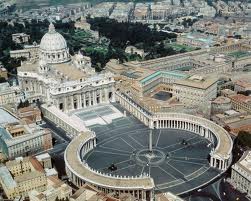
Visiting Vatican city? You’ll need cash.
Italy has blocked the use of debit and credit cards in the Vatican because of concerns over lack of transparency, in a major obstacle to one of the tiny city state’s biggest sources of income, financial sources said on Thursday.
A source close to the Bank of Italy said the central bank in December denied a permit for Deutsche Bank Italy, the Vatican’s previous provider of electronic payment services, because the Holy See was seen as lacking anti-money laundering controls and oversight.
It’s not the first time the Holy Mother Church and money laundering meet.
The Vatican has struggled to shake off a reputation for a lack of financial transparency that dates back to 1982, when Roberto Calvi, an Italian known as “God’s banker” because of his links to the Vatican, was found hanged under London’s Blackfriars Bridge.
In 2012 report by Moneyval, a Council of Europe-backed committee, found serious failings in the Vatican bank, or Institute for Works of Religion, and urged it to strengthen measures to prevent money laundering and increase transparency.
“The Bank of Italy did not approve Deutsche Bank’s request for a licence because Italy does not see the Vatican as a fully compliant country under money-laundering norms,” another source close to the matter told Reuters.
And at times it has been even seedier.
The Vatican has struggled to shake off a reputation for a lack of financial transparency that dates back to 1982, when Roberto Calvi, an Italian known as “God’s banker” because of his links to the Vatican, was found hanged under London’s Blackfriars Bridge.
Good thing to know in the intervening 30 years they have learned their lesson.
